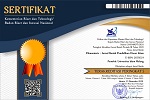PENINGKATAN KEDISIPLINAN ANAK USIA DINI MELALUI METODE PEMBIASAAN TOKEN ECONOMY
DOI:
https://doi.org/10.33474/elementeris.v1i1.2667Abstract
In general, the purpose of this study was to improve the discipline of early childhood through the method of token economy habituation in class II even semester 2016-2017 SD Cherry South Jakarta. The method of token economy refraction is a method of strengthening behavior by giving points (reward). In particular, the discipline referred to in this study is the presence of children on time at school. This research method is classroom action research which follows the models of Kemmis and Taggart. This study consisted of two cycles. Each cycle includes 4 stages, namely, 1) planning (planning), 2) acting (implementation), 3) observing (observation), 4) reflecting (reflection). The research time is 1 month, from April 2017 to May 2017 with the subject of research as many as 11 students, while the data is collected by observation, interviews, and documentation. The results showed that there was a significant increase in discipline in class II students. This can be evidenced by the increase in the results of quantitative calculations starting from the results of the average pre-action discipline, cycle 1 to cycle 2, namely the results of the pre-action average = 12, cycle 1 = 13.27, cycle 2 = 15 and the results of interviews concluded that the method of habituating token economy can motivate discipline in early childhood optimally. This study concludes that discipline with the method of habituating token economy can improve the discipline of early chilhood.References
Arikunto, Suharsimi. (2006). Prosedur Penelitian suatu Pendekatan Praktek. Jakarta:Rineka Cipta
Berk, L.E. (2005) Infants, Children, and Adolescence 5th Ed. America : Pearson Education, Inc.
Corey, Gerald. (2005). Teori dan Praktek Konseling dan Terapi, Bandung:Refika Aditama
Fairbanks, Sarah, dan George Sugai. (2004). Token Economy. University of Connecticut: https://doi.org/10.1002/9781118660584.ese2403
Fisher, Piazza, dan Roane. (2013). Handbook of Applied Behavior Analysis. New York:Guilford Publisher
Garmo, John. (2013) Pengembangan Karakter untuk Anak. Jakarta:Kesaint Blanc
Hurlock, Elizabeth, B. (1980). Psikologi Perkembangan. Jakarta:Erlangga
Macmillan, Donald L. (1973). Behavior Modification in Education. Amerika:Universitas Michigan.
Model Pembinaan Pendidikan Karakter di Lingkungan Sekolah. (2010). Direktorat Jenderal Manajemen Pendidikan Dasar dan Menengah
Mulyadi, Seto.(2012). Financial Parenting. Jakarta: Noura Books
Papalia, Olds, Feldman. (2009). Perkembangan Manusia. Jakarta:Salemba Humanika
Pedoman Akademik STKIP Kusuma Negara Tahun Akademik 2015
Purwadarminta, W.J.S. (2003) Kamus Besar Bahasa Indonesia, Jakarta:Balai Pustaka
Saepudin, Asep. Kumpulan Bahan Perkuliahan PTK, 2014
Sulzer-Azaroff, B. & Mayer, R. (1991). Behavior analysis for lasting change. Fort Worth, TX: Holt, Reinhart & Winston, Inc
Troutman, Anne C & Paul Alberto. (2003). Applied Behavior Analysis for Teachers. Prentice Hall:Merril Publishing Company
UU Nomor 20 Tahun 2013 tentang Sistem Pendidikan Nasional
Winataputra, Udin, dkk. Teori Belajar dan Pembelajaran. Jakarta:Universitas Terbuka, 2008
Downloads
Published
Issue
Section
License
The journal operates an Open Access policy under a Creative Commons Non-Commercial 4.0 International license. Authors who publish with this journal agree to the following terms:
- Authors retain copyright and grant the journal right of first publication with the work simultaneously licensed under a Commons Attribution-NonCommercial 4.0 International License
that allows others to share — copy and redistribute the material in any medium or format, and adapt — remix, transform, and build upon the material.
- Authors are able to enter into separate, additional contractual arrangements for the non-exclusive distribution of the journal's published version of the work (e.g., post it to an institutional repository or publish it in a book), with an acknowledgement of its initial publication in this journal.
- Authors are permitted and encouraged to post their work online (e.g., in institutional repositories or on their website) prior to and during the submission process, as it can lead to productive exchanges, as well as earlier and greater citation of published work.
Elementeris: Jurnal Ilmiah Pendidikan Dasar Islam by Universitas Islam Malang is licensed under a Creative Commons Attribution-NonCommercial 4.0 International License.
Based on a work at http://riset.unisma.ac.id/index.php/je/index.















